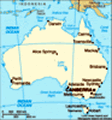Advertisement
Published: February 13th 2011
Thursday 13 January 2011 – the day of reckoning had arrived. The alarm in my mobile phone woke me at the appointed hour of 04:00 in the morning, the time when the floodwaters would be at their highest level. If the 1974 flood experience was repeated, then water could isolate me for days. I listened for unexpected sounds from outside, but all was silent except for alarms that had continued throughout the night. I tentatively moved to the window. Would the water be knee-high as expected or had it only filled the gutters? I anxiously looked downwards – and through the dim dawn light, the street below me was dry. The expected peak of 5.45 metres had been revised downwards twice to 4.60 metres, and this lower level kept the street in my immediate vicinity free of water.
With torch in hand, I headed down the stairwell and onto the road where I met a Navy Reservist, who uttered in a broad Australian accent, “We’ve dodged a bullet.” Walking down my street, I saw that the water had come within 100 metres of my front door, but no further. However, surrounding roads were still blocked and it would be two
more days before it was possible for me to leave Southbank. The morning brought the first sound of army helicopters scouring the river, their pulsating noise reverberating off the buildings, and I would become accustomed to this noise in the forthcoming days.
I checked the underground car park and the place was filled with the sound of rushing water, so despite escaping the water from the road, it was causing massive problems underground. Some cars remained, their owners unable to return from interstate or overseas in time to shift them, but it appeared these vehicles would be saved. Unfortunately, nobody had cleaned the grease traps prior to the floods (an obvious move if you ask me) so disgusting patches of oil floated on the water surface.
Speaking to a restaurant owner who had returned to find his business untouched by the waters, yet his food supplies destroyed due to the electricity outage, his eyes looked frustrated as he murmured with a smile, “If you don’t laugh, you’ll cry”. This ability to find humour in times of adversity is another distinctive feature that defines the approach of Australians to natural disasters. Our small recovery group found humour in a
radio report “warning” people to not be concerned at the sight of two coffins with bodies inside floating downstream, as these were Halloween props washed away from a balcony. At another time, Brendan questioned Lorraine as to whether our rents would increase due to our properties now being classed as “river frontage”.
Despite the dire predictions, the situation was better than anticipated, but that was until nearby buildings decided to pump water from their flooded car parks. This was most reckless as the water flowing into the drains entered an already high water table, and thus as waters around Southbank were receding on the roads, this pumping meant that it was increasing in our carpark. Worst of all, the rise was accompanied by a change in water colour and a horrid smell that was a combination of decay, cooking oil and sewerage, and it began to permeate the whole building. Unfortunately this second inundation meant that three cars in the carpark were lost as the water increased to be head-high in parts. My storage shed also fell victim to the water, thus confirming my foresight in shifting my possessions from there two nights before. The regular checks of the
water levels here became an unpleasant affair, and within two days the odour became so overpowering that we ceased venturing into the car park at all.
After 48 hours without electricity, I disposed of all items in my fridge and freezer, but it was a better situation than one of my neighbours who was overseas during the floods, as by the fifth day without power, all the items in his fridge transformed into different life forms and the smell emanating from his apartment was horrendous. Cleaning out that fridge would be one of the more unpleasant tasks in life. The swollen river and rotting food attracted more mosquitoes than usual and a repugnant stench permeated the air, so I burnt incense every night to ensure I rested in a salubriously smelling environment.
With over 150 million litres of floodwater (60 Olympic size swimming pools) needing to be removed from the underground carpark before electricians could reach the power board and substations, it would be a long time before power is restored. The days and nights were filled with the sound of whirring pumps as they guzzled the contaminated waters from underneath my building.
Though the flood water was
now receding, the mud remained. This was no ordinary mud, but a disgusting, thick, smelly ooze that covered everything and was exceedingly difficult to remove. If one stepped in this viscous muck it would freeze in its place, waiting for a disturbance from somebody or something else so that it could assume a different shape. The nearby area at the Queensland Performing Arts Complex was a mess, machines were doing their best to remove the mud and damaged furniture and fittings that had the misfortune to be in the basement storage areas lay in huge piles waiting to be removed.
I was tiring of cold showers, so once I was able to leave Southbank on Saturday, I visited my friend Fi (who never lost electricity) to wash clothes and have a warm shower. Walking there, I passed through the central mall of Brisbane, and everything seemed as if nothing had happened, or was currently happening. People were engaging in their usual activities of chatting in cafes, browsing shops and meeting friends. It seemed so surreal for within a 10 minute walk, the area surrounding my place was a shambles as workers and machinery fought to return life to normality.
At Fi’s place, and for the first time since the flood struck, I finally saw the full devastation of the flood upon Brisbane by watching television and scouring news websites – it was numbing. These floods were garnering large attention overseas based on the number of emails I had received – notes of concern and wishes were sent to me from every continent (except for Antarctica). It was comforting to know that people’s thoughts were with me and my city during these days.
I returned home, passing the armies of trade people cleaning Southbank and its environs, and to spend a few more nights of cold showers. On Tuesday I was able to access hot showers and electricity in the sister apartment complex which managed to have power restored two days earlier. Finally, on Thursday, I returned home from work to discover that electricity to my apartment had been restored. The simple pleasure of being able to flick a switch and see a light bulb glow, and to have a refrigerator where I could chill water was immense. I was very fortunate that I did not suffer more apart from a eight days without power, a smelly fridge,
cold showers, broken router (power surge I suspect) and a month without the use of my storage shed. Thankfully, I live in a country whose experience in dealing with the scourges of flood, fire and cyclone enable it to mobilise an immense force of recovery teams to restore broken lives and broken homes.
This was the largest natural disaster in terms of economic impact in Australia’s history; figures are only provisional, but the estimated cost of the floods in terms of repair and economic loss is approximately 13 billion dollars. The restaurants at Southbank are now operational again and visitors have returned, but the beach and boardwalk will be closed for months. The infrastructure is taking weeks to recover, but the natural parklands regenerated quickly; nature always has superior means of survival than objects created with our own hands.
Though this flood brought many dark hours, the gloom was illuminated by the qualities Australians bring to their community in times of tribulation; generosity to those who have suffered loss, humour in the face of adversity, and a resilience to continue their lives stronger than before. At moments likes these, it makes one proud to be an Australian.
Advertisement
Tot: 0.072s; Tpl: 0.015s; cc: 8; qc: 23; dbt: 0.0482s; 1; m:domysql w:travelblog (10.17.0.13); sld: 1;
; mem: 1.1mb



























anonymous
non-member comment
This stands out as a great tribute to your countrymen (and women) the things they are achieving to get Brisbane and other places into shape, of course you are proud to be Australian as we are proud to know you all. Fi always pops up when she is needed a little Angel. Lorraine Brendan and yourself look pretty clean after all that mud!! great photo's , keep smiling. Thanks Shane.